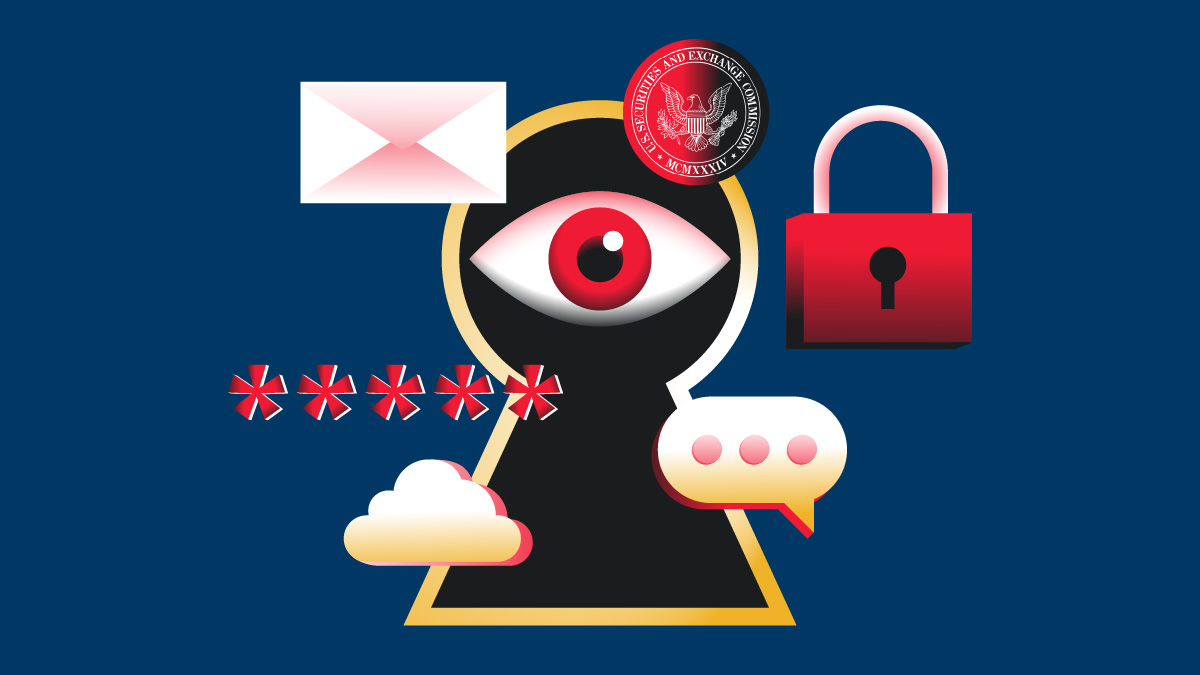SEC Cybersecurity Rules: A Guide for Whistleblowers
The SEC's cybersecurity regulations require companies to disclose material cyber incidents and provide detailed information about their risk management practices. This guide will delve into the specifics of these rules, their implications for whistleblowers, and how to report potential violations.
May 14, 2025

This information is provided for educational purposes only by Kohn, Kohn & Colapinto and does not constitute legal advice. No attorney-client relationship is created by accessing this content. Laws and regulations may change, and this material may not reflect the most current legal developments. If you believe you have a whistleblower claim, consult a qualified attorney to discuss your specific circumstances.
Understanding the SEC’s Cybersecurity Rule
On July 26, 2023, the Securities and Exchange Commission (SEC) adopted new rules requiring registrants to disclose material cybersecurity incidents on Form 8-K within four days of determining their materiality. This rule also requires registrants to provide disclosures on Form 10-K regarding cybersecurity risk management process, strategies, and governance. And lastly, the rule also requires foreign private issuers must make similar disclosures on Form 6-K for material incidents and Form 20-F for annual risk management.
In a press release, SEC Chair Gary Gensler stated:
“Whether a company loses a factory in a fire — or millions of files in a cybersecurity incident — it may be material to investors…Currently, many public companies provide cybersecurity disclosure to investors. I think companies and investors alike, however, would benefit if this disclosure were made in a more consistent, comparable, and decision-useful way. Through helping to ensure that companies disclose material cybersecurity information, today’s rules will benefit investors, companies, and the markets connecting them.”
Key Takeaways of this Comment and Rule
- The rule aims to enhance investor protection by providing more detailed and timely information about cybersecurity risks.
- Companies will need to strengthen their cybersecurity programs and disclosure processes to comply with the new requirements.
- Investors can benefit from increased transparency and better understand the cybersecurity risks faced by their investments.
Insiders who have information regarding a violation of this rule may anonymously report their concerns to the Commission under the SEC Whistleblower Program. Whistleblower awards can range from 10 percent to 30 percent of the money collected when the monetary sanctions exceed $1 million – sanctions can include civil penalties, disgorgement, and interest.
Continue reading to learn more about this rule and other proposed rules, such as Rule 10, which enhances the cybersecurity requirements for certain covered categories of regulated financial markets participants, and about the SEC Whistleblower Program.
What is Considered a Cybersecurity Incident?
An incident is based on materiality, meaning: if a shareholder would consider important in making sound investment decisions, the incident likely meets the “materiality” criteria. Materiality is an inquiry based on the company and special circumstances of the incident. For example, determining significance depends on many factors, which may include:
- Incident Severity: was the incident major, such as one that can cause a system outrage? Or was the incident just an insignificant data breach?
- Financial Loss: did the incident cause major losses or reputational damage? Was there a pause in operations because of the incident?
- Data Sensitivity: did the data that was compromised contain confidential or personally identifiable information that could cause disruption?
- Regulation: were there regulations or other laws within your industry that require disclosure of such incidents?
Cybersecurity Incident Types
There are many different types of ways in which an organization’s information or IT systems can be compromised. Compromised meaning: the integrity, confidentiality, or availability of the system falls below best security standards.
Below are a few of the types of incidents that could occur, which may require a disclosure:
- Data breaches: unauthorized access to sensitive data, such as customer records, financial information, or intellectual property.
- Zero-day attacks: these are attacks that exploit an unknown software vulnerability for which there is no available patch.
- Malware attacks: infection of systems with malicious software, like viruses, ransomware, or spyware.
- Phishing attacks: deceptive tactics used to trick individuals into revealing sensitive information, like passwords or credit card numbers.
- Denial-of-service (DoS) attacks: overwhelming a system or network with traffic, making it inaccessible to legitimate users.
- Insider threats: malicious actions by employees or contractors who have authorized access to systems.
- System failures: hardware or software malfunctions that disrupt operations.
- Human error: mistakes made by employees that lead to security breaches.
Cyber threats are constantly evolving and so are the sophisticated tactics, techniques, and procedures to cause harmful cybersecurity incidents. Companies need to have a clear plan for detecting, containing, investigation and recovering from such incidents, and hardening their systems against such incidents, or they may be subject to regulatory scrutiny and enforcement.
What about 3rd Party Breaches?
If an incident happens on a third-party platform, companies may still be required to disclose it, regardless of where the incident happened and how much information is available.
Four-Day Deadline
The four-day reporting deadline starts when you determine the incident could have a material impact on your company, not when the incident was discovered. You may need some time to assess the situation and determine materiality.
Delay Provision for Incident Disclosure
There are ways to delay the reporting of a cybersecurity incident, if say the incident poses a risk to public safety. For now, the limit is 120 days, which can be extended upon SEC’s approval.
The FBI basically takes intakes on behalf of the DOJ and believes that a delay is warranted if there is a concern that the incident has an impact on national security or public safety. For a company to use the delay provision, they must file with the FBI through another U.S. agency.
See the DOJ Cyber Incident Notification Delay Guidelines for more information on this.
Cybersecurity Risk Management
The SEC’s new cybersecurity rule mandates that registrants disclose details about their cybersecurity risk management practices. This includes how cybersecurity is integrated into their risk management, the use of third-party assessors or consultants, processes for identifying risks from third parties, and the impact of past or potential future cybersecurity incidents.
Additionally, companies must disclose the board’s role in overseeing cybersecurity risks, the specific committee responsible for oversight, and the processes for informing the board about cybersecurity risks. Companies must also disclose the management positions responsible for cybersecurity, the relevant expertise of those individuals, processes for monitoring and addressing cybersecurity incidents, and reporting mechanisms to the board.
Proposed New Rule 10 for Market Entities
On March 15, 2023, the Securities and Exchange Commission proposed a new rule which would require market entities to address their cybersecurity risks.
Market entity refers to any broker-dealers, clearing agencies, major security-based swap participants, the Municipal Securities Rulemaking Board, national securities associations, national securities exchanges, security-based swap data repositories, security-based swap dealers, and transfer agents (collectively, “Market Entities”) to address their cybersecurity risks.
According to the Cybersecurity and Infrastructure Security Agency, the financial services sector is critical, “whose assets, systems, and networks, whether physical or virtual, are considered so vital to the United States that their incapacitation or destruction would have a debilitating effect on security, national economic security, national public health or safety, or any combination thereof.” This rule addresses such concerns.
Key Requirements for All Market Entities
The rule would require that large financial institutions must implement strong cybersecurity programs and practices, such as regular risk assessments, strong access controls, incident response plans, and regular reviews and assessments of cybersecurity policies and procedures.
Key Requirements for Covered Entities
Covered entities will be required to implement key cybersecurity measures. These include conducting periodic risk assessments to identify and document potential vulnerabilities, implementing strong access controls to prevent unauthorized access, and monitoring systems to detect and respond to threats.
Additionally, covered entities must have robust incident response plans to handle cybersecurity incidents effectively. Finally, they will be required to publicly disclose information about their cybersecurity risks and incidents on Part II of the proposed Form SCIR. Proposed Rule 10 would require that covered entities provide immediate written notice to the SEC of any significant cybersecurity incident.
SEC Whistleblower Program: Reporting Incidents
The SEC Whistleblower Program allows whistleblowers to report securities fraud and other violations of federal securities laws, such as violations of the SEC cybersecurity rule, to the Commission. There are several key features of this program, which include the following:
- Monetary Awards: eligible whistleblowers can receive awards between 10% and 30% of the total monetary sanctions collected in SEC enforcement actions exceeding $1 million.
- Protection Against Retaliation: the program provides strong protections against retaliation from employers and maintains strong confidentiality.
- Anonymity: whistleblowers can choose to remain anonymous during the reporting process (and award claims process), but they must hire an attorney.
The SEC Whistleblower Program has proven to be a powerful tool in combating financial fraud and corporate misconduct. By incentivizing whistleblowers, the program has led to numerous successful enforcement actions and recovered billions of dollars for investors.
By reporting potential securities law violations, whistleblowers help protect investors, strengthen security practices within the financial sector, and maintain market integrity.
Reporting Your Concerns
Whistleblowers may report their concerns using the SEC’s online Tips, Complaints, Referrals (TCR) system. They can also mail or fax their Form TCR to the following address:
SEC Office of the Whistleblower (c/o ENF-CPU)
14420 Albemarle Point Place, Suite 102
Chantilly, VA 20151-1750
ATTN: SEC TCR SUBMISSIONS
However, given the complexity of whistleblowing, rules for disclosing information, and deadlines, we strongly suggest contacting an experienced SEC whistleblower attorney. Failure to do so could result in your tip not being pursued by the Commission or you receiving a lesser award amount.
More importantly, it’s important to keep in mind that if you choose to submit your information anonymously, i.e., without providing your identity or contact information, you must be represented by, and provide contact information for, an attorney in connection with your submission to be eligible for an award.
Get Legal Help
Led by former SEC acting chair and commissioner Allison Herren Lee, former SEC Enforcement Senior Counsel Andrew Feller, and renowned whistleblower attorney Stephen M. Kohn, our team has been shaping the landscape of whistleblower protection for over 35 years.
If you have information regarding violations of cybersecurity rules and other securities laws violations, our team is ready to help. Contact us today for a free case evaluation. There’s no fee unless we get you an award.
Our Firm’s Cases

Environment & Human Rights Violations Exposed
Oil industry’s environmental crimes and cover-up in Colombia have been exposed. Whistleblower Andrés Olarte Peña, with the support of his attorneys Kohn, Kohn & Colapinto and the damning evidence compiled in the Iguana Papers, is calling for an investigation into Ecopetrol and its executives by the Colombian government and the U.S. Securities and Exchange Commission.

$30 Million Award
Protecting the confidentiality of Wall Street whistleblowers is among the most important breakthroughs in federal whistleblower law. Under the Dodd-Frank Act, whistleblowers can file anonymous cases, and everything about their case, including who they sued, remains secret.

$13.5 Million Award
Our firm represented an anonymous whistleblower, who on May 17, 2021, received a whistleblower award of almost $13.5 million. The SEC has issued more than $31 million in whistleblower awards related to this case.
![Reporting Recordkeeping Failures To The Sec [2025 Guide]](https://kkc.com/wp-content/uploads/2025/01/Recordkeeping-Failures.jpg)




